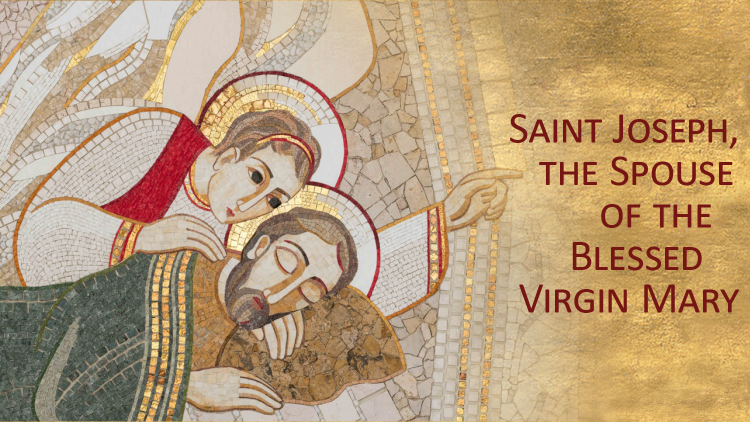
Solemnity of Saint Joseph, the Spouse of the Blessed Virgin Mary
In the West, the oldest reference to the cult of Saint Joseph (Ioseph sponsus Mariae) connected with 19 March appears around the year 800 in the north of France. Thereafter, reference to Joseph, the spouse of Mary, becomes more and more frequent from the 9th to the 14th centuries. In the 12th century, the crusaders built a church in his honor at Nazareth. But it was in the 15th century that the cult of Saint Joseph spread due to the influence of Saint Bernadine of Siena, and especially of Jean Gerson (+ 1420), Chancellor of Notre Dame in Paris, who promoted the cause that a feast to Saint Joseph be officially established. There were already some celebrations in Milan in Augustinian circles, and in many places in Germany. It was in 1480, with Pope Sixtus IV’s approval that the feast began to be celebrated on 19 March. It then became obligatory with Pope Gregory XV in 1621. In 1870, Pope Pius IX declared Saint Joseph the Patron of the Universal Church, and Pope Saint John XXIII inserted his name into the Roman Canon of Holy Mass in 1962. More recently, Pope Francis approved seven new invocations in the Litany to Saint Joseph: Guardian of the Redeemer, Servant of Christ, Minister of Salvation, Support in difficulties, Patron of exiles, Patron of the afflicted, and Patron of the poor.
Jacob was the father of Joseph, the husband of Mary. Of her was born Jesus who is called the Christ. Now this is how the birth of Jesus Christ came about. When his mother Mary was betrothed to Joseph, but before they lived together, she was found with child through the Holy Spirit. Joseph her husband, since he was a righteous man, yet unwilling to expose her to shame, decided to divorce her quietly. Such was his intention when, behold, the angel of the Lord appeared to him in a dream and said, “Joseph, son of David, do not be afraid to take Mary your wife into your home. For it is through the Holy Spirit that this child has been conceived in her. She will bear a son and you are to name him Jesus, because he will save his people from their sins.” When Joseph awoke, he did as the angel of the Lord had commanded him and took his wife into his home. (Mt. 1:16, 18-21, 24)
The liturgy also proposes Lk 2:41-51 as an option
Beloved father
Joseph placed himself at the service of God’s plan of salvation. He cared for the Holy Family that God had entrusted to him. He became an attentive servant from the moment of the Annunciation, a provident servant in caring for Mary and the Child she carried in her womb. He defended the Family in the moment of danger. These are just a few of Saint Joseph’s traits that explain why the People of God are especially devoted to him.
Tender and loving father
Joseph taught Jesus how to walk, holding Him by the hand. Jesus saw the tenderness of God in Joseph, the Just Man. In Joseph, Jesus saw a man of faith who knew how to view life with hope because, in the midst of the storm, God remains steadfast at the helm of the course of life.
Obedient father
God’s plan was revealed to Joseph through dreams. He always responded promptly: at the moment of the Annunciation of the Lord, when Herod wanted to kill the Child, when Herod died. Joseph was guided by God and he obeyed. Jesus absorbed this filial “submission” to God from Joseph. He learned obedience from His parents.
Accepting father
Joseph is presented as someone who is respectful and sensitive, capable of placing Mary’s dignity and life above everything else, even above his own reputation. Joseph accepts, certain that everything is guided by God’s providence. He understood that life reveals itself according to the degree to which God’s plan is accepted, to the degree to which we reconcile ourselves to God’s plan. This is Christian realism: to accept, to welcome God into our own personal history, to learn how to welcome and accept everyone we meet.
Creatively courageous father
In the face of difficulties, Joseph always brought out the most unexpected resources. Joseph is the man through whom God manifested His providential care from the beginning of the history of salvation. Difficulties never stopped the boldness and tenacity of this just and wise man in whom God trusted, just as He trusted in Mary. This is how we see in Joseph the Guardian of the Holy Family: first of his family in Nazareth, and today, of the Church.
Working father
Work, understood as participating in God’s own work, is what Joseph carried out in his own life and what he taught Jesus. Work is important to bring to birth a new “normal”, in which no one is excluded. Saint Joseph’s work recalls that Jesus, the Son of God-made-Man did not disdain manual labor. Work guarantees human dignity.
Father in the shadows
As a father, Joseph introduced the Son of God to life’s experiences and realities: not holding Him back, not confining Him, not possessing Him, but fostering His capacity of making choices, His freedom, eventually letting Him leave home. The logic of love is always the logic of freedom: Joseph’s joy is the gift of himself. He made himself obsolete. At a certain point, he stayed in the background so that his Son could emerge.
Prayer
Hail, Guardian of the Redeemer,
Spouse of the Blessed Virgin Mary.
To you God entrusted his only Son;
in you Mary placed her trust
with you Christ became man.
Blessed Joseph, to us too,
show yourself a father
and guide us in the path of life.
Obtain for us grace, mercy and courage,
and defend us from every evil. Amen.
(Prayer from the Apostolic Letter Patris Corde, written by Pope Francis)








